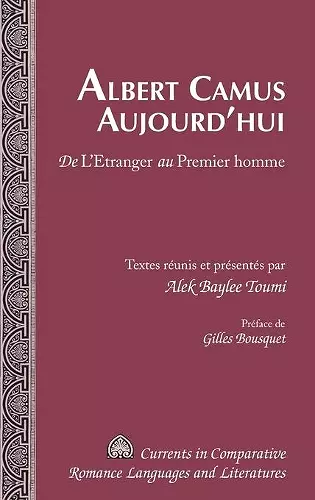Albert Camus Aujourd'hui
De L'Etranger au Premier Homme Preface de Gilles Bousquet
Format:Hardback
Publisher:Peter Lang Publishing Inc
Published:13th Mar '12
Currently unavailable, and unfortunately no date known when it will be back

Le 04 janvier 1960, Albert Camus s'en allait un peu dans un tragique accident de voiture a l'age de 47 ans. Quatre annees auparavant, il etait l'un des plus jeunes ecrivains a recevoir le prix Nobel de litterature pour toute son oeuvre. L'enfance pauvre a Belcourt, la passion du football, le journalisme a Alger Republicain puis l'exclusion et l'exil par la France de Vichy, Camus sera force de monter a Paris. Il rejoindra la Resistance et sera le redacteur en chef de Combat. Romancier, dramaturge, essayiste, Camus sera aussi acteur et metteur en scene. Apres la publication de L'Homme revolte, puis la rupture avec son ami Jean-Paul Sartre, il quittera Combat puis ecrira des articles sur l'Algerie avant de se taire completement, sans neanmoins cesser d'agir en silence. Certainement pas existentialiste, anti-communiste tres tot, il avait ete l'Intellectuel de la periode 45-60 d'apres la liberation, celui dont le nom finira par etre oppose a celui de Sartre. Si Camus est mort jeune, il aura vecu pleinement sa courte vie; et s'il est encore difficile de le categoriser, il reste encore d'actualite, souleve souvent des passions, ne laissant jamais indifferent. Peut-on parler d'un heritage camusien ? Que reste-t-il de son oeuvre en Amerique ? Afin de ne pas oublier cet etranger si familier, pour le cinquantenaire de la mort de Camus, le Bureau du Doyen des Etudes Internationales et le Centre d'Etudes Europeennes de l'Universite du Wisconsin-Madison ont organise du 22 au 24 avril 2010, un symposium Albert Camus, 50 ans apres, autour des trois grands themes suivants: Camus et l'Algerie, Camus et l'exil, Camus et le public. Une quinzaine d'universitaires, de chercheurs, et de professeurs, d'Algerie, de France, du Canada et des Etats-Unis, etaient presents a ces journees dont nous publions les Actes dans cet ouvrage. L'objectif de ce second colloque etait de creer un debat autour de Camus et de sa vision, souvent prophetique, relire ses ecrits litteraires et politiques et voir dans quelle mesure son oeuvre pacifiste, peut etre une source d'inspiration dans les luttes pour la liberte et la democratie, une alternative a la violence et a la terreur qui demeurent aujourd'hui encore, helas tres actuelles.
In honor of the fiftieth anniversary of Albert Camus's untimely death, this volume celebrates the unforgettable contributions and originality of the well-known writer. These superb essays examine his oeuvre, analyzing the diverse voices, complex cultural context, multiple interpretations resulting from translation, as well as themes including, but not limited to, freedom, violence, exile, political engagement, and the aesthetics of the absurd, offering thus a more complex cultural reading of the text. This volume represents a noteworthy contribution to francophone criticism as well as a significant engagement with a major writer, one who has indelibly marked both his generation and those that followed. (E. Nicole Meyer, PhD, Professor of French, Humanistic Studies and Women's and Gender Studies Coordinator University of Wisconsin-Green Bay) In the fifty years that have followed the death of Albert Camus, his legacy as one of Europe's most important intellectuals of the twentieth century has not diminished. Professor Alek Baylee Toumi has edited a significant collection of essays which examine the contemporary status of 'l'heritage camusien.' This volume of essays by established Camus scholars from Europe and North America also features the work of the newest generation of experts to analyze the creative and critical writings of Albert Camus. Speaking of his legacy, from the fifty years that mark his passing in 2010, to the centenary that will mark his birth in 1213, noted journalist Jean Daniel has said: '[...] today, the only question is about Camus', an observation that reminds us today that Camus's fiction and essays dealing with universal themes can still provide insight into the most pressing questions of the present-day era, namely, justice for the world's oppressed, the limits of political violence, and the role of the intellectual in the wider society. This volume will be a great asset to scholars of French and European Studies. (Patricia Geesey, Professor of French, University of North Florida) The death of Camus remains opaque like the protagonists of his major novels, and the interest of posterity on his career grows by leaps and bounds. The memory of Camus is still inextricably linked to the passionate polemics with Sartre but the judgment of posterity seems to vindicate Camus almost on every point. The intellectual space for independent leftism of any kind in our time is quickly shrinking, but Camus stands taller as a political visionary because his view of freedom was untainted by Stalinism or other fashionable cloak-and-dagger theories. Camus' work has received its large share of diverse critical readers, an indication that the position of today's readers in relation to his work has also changed. The present volume is carefully crafted to introduce the timelessness of Camus' readings, and it should go long ways in inspiring a new generation of enthusiasts in the treacherous political waters of our times. (Giuseppe Candela, Associate Professor of Italian, Arizona State University)
ISBN: 9781433118494
Dimensions: unknown
Weight: 380g
165 pages
New edition